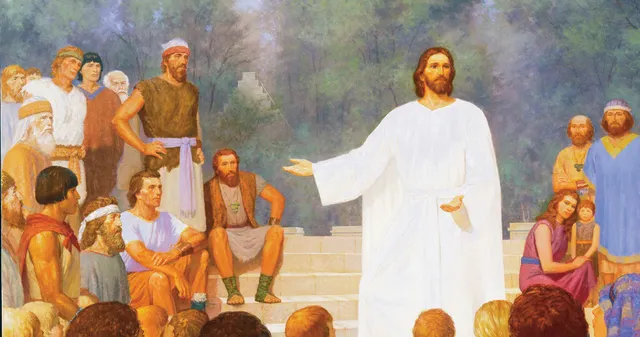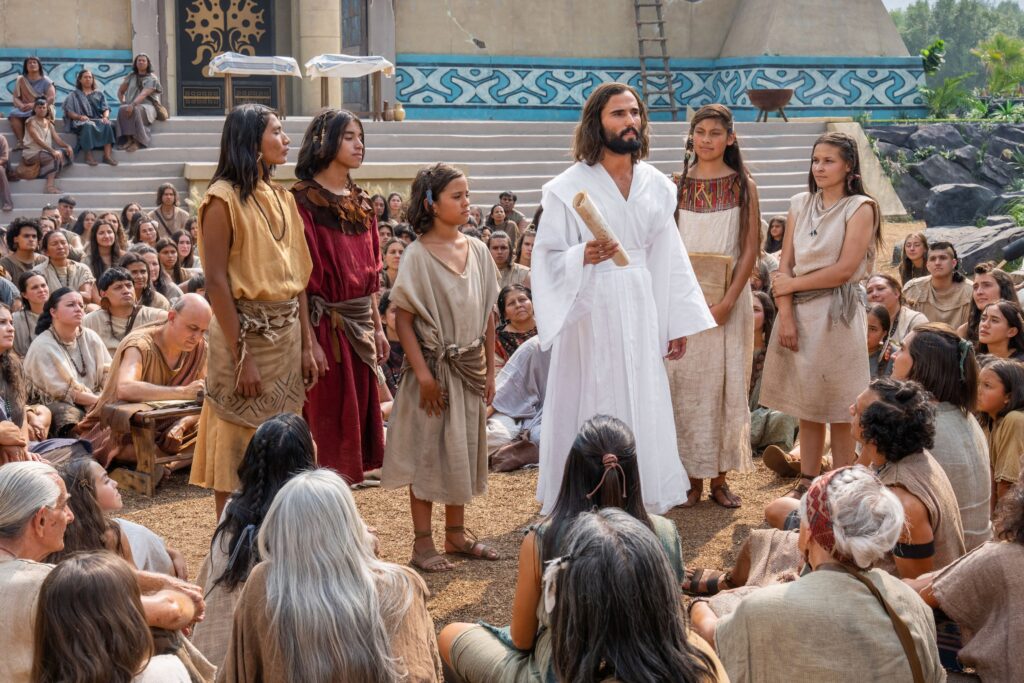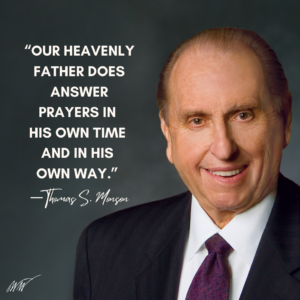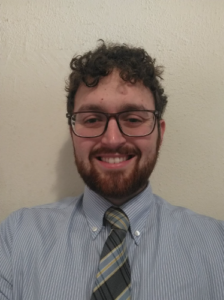
FAIR is a non-profit organization dedicated to providing well-documented answers to criticisms of the doctrine, practice, and history of The Church of Jesus Christ of Latter-day Saints.

“We Rejoice in Christ”
Book of Mormon Chapters: 3 Nephi 12–16
Historical Context: Jesus Christ appears to the Nephites, teaching the higher law; compare to the Sermon on the Mount in the New Testament.
If you have questions on this week’s reading, please email your questions to us here.
There are many principles to find in 3 Nephi 12–16. Some are highlighted in the lesson outline, but you will find others. Let Heavenly Father, through His Spirit, teach you what you need right now.
I hasten to say that focusing on the Father’s and the Son’s achievements rather than our failures does not give us one ounce of justification for undisciplined lives or dumbing down our standards. No, from the beginning the gospel has been “for the perfecting of the saints, … till we … come … unto a perfect man, unto the measure of the stature of the fulness of Christ.” I am simply suggesting that at least one purpose of a scripture or a commandment can be to remind us just how magnificent “the measure of the stature of the fulness of Christ” really is, inspiring in us greater love and admiration for Him and a greater desire to be like Him.
“Yea, come unto Christ, and be perfected in him … ,” Moroni pleads. “Love God with all your might, mind and strength, then … by his grace ye may be perfect in Christ.” Our only hope for true perfection is in receiving it as a gift from heaven—we can’t “earn” it. Thus, the grace of Christ offers us not only salvation from sorrow and sin and death but also salvation from our own persistent self-criticism.”
Jeffrey R. Holland, “Be Ye Therefore Perfect – Eventually“
(Compare to Matthew 5)
1-2: Jesus begins teaching the multitude who are gathered in Bountiful. He shares the blessings available as they accept and live His teachings, beginning with faith, baptism and receiving the Holy Ghost.
3-16: The beatitudes are taught to the Nephites, emphasizing the qualities we need to develop on our Christian journey.
17-48: The Savior explains one aspect of His mission, which is to fulfill the Law of Moses. “Old things are done away and all things have become new.” (v.47) This includes turning the other cheek, loving our enemies and controlling our lusts and anger. He concludes with an invitation for us to all strive to become like Him.

I will never forget the feeling of the Spirit I felt in the Conference Center in April of 2018 as President Russell M. Nelson, the newly ordained prophet, spoke about changes to how elders quorum would be organized and as he called for the men to arise by quorums. I felt the Spirit testify to me that …
I will never forget the feeling of the Spirit I felt in the Conference Center in April of 2018 as President Russell M. Nelson, the newly ordained prophet, spoke about changes to how elders quorum would be organized and as he called for the men to arise by quorums. I felt the Spirit testify to me that President Nelson was a prophet of God and that the changes being made that day were correct. There have been numerous changes in the Church in my lifetime. The missionary age change, ministering, the way temple ordinances are administered, the reemphasis on using the name of the Church, among several other changes reflect the ongoing process of revelation and inspiration.
 This week in Come, Follow Me we study about Christ’s visit to the Americas following His death and Resurrection. This visit is recorded in the book of 3 Nephi and allows us a glimpse into one of the most sacred times in human history as the Resurrected Savior ministered and taught the people gathered in Bountiful. During this visit, Christ taught the higher law that would help them to “be perfect” (3 Nephi 12:48). He told the people, “Therefore those things which were of old time, which were under the law, in me are all fulfilled. Old things are done away, and all things have become new” (3 Nephi 12:46–47).
This week in Come, Follow Me we study about Christ’s visit to the Americas following His death and Resurrection. This visit is recorded in the book of 3 Nephi and allows us a glimpse into one of the most sacred times in human history as the Resurrected Savior ministered and taught the people gathered in Bountiful. During this visit, Christ taught the higher law that would help them to “be perfect” (3 Nephi 12:48). He told the people, “Therefore those things which were of old time, which were under the law, in me are all fulfilled. Old things are done away, and all things have become new” (3 Nephi 12:46–47).
The scriptural record notes that “when Jesus had said these words he perceived that there were some among them who marveled, and wondered what he would concerning the law of Moses; for they understood not the saying that old things had passed away, and that all things had become new” (3 Nephi 15:2). Christ lovingly reminded the people, “I do not destroy the prophets, for as many as have not been fulfilled in me, verily I say unto you, shall all be fulfilled. . . . I am the law, and the light. Look unto me, and endure to the end, and ye shall live; for unto him that endureth to the end will I give eternal life” (3 Nephi 15:6, 9). Christ was teaching the people gathered in Bountiful that changes in how the Church is run are meant to bring us closer to Him—change did not discredit past revelation, but rather signaled a new period of growth and revelation.
Wilford Woodruff saw this in his own life when the Lord inspired him to issue the Manifesto. Many criticized him for making this change, and President Woodruff noted in one journal, “The Lord has revealed to me that there are many in the Church who feel badly tried about the Manifesto and also about the Testimony of the Presidency & Apostles.”[1] However, President Woodruff knew that what the Lord had revealed to him was true. In his journal, on September 25, 1890, President Woodruff noted that he wrote the Manifesto “after Praying to the Lord & feeling inspired by his spirit.”[2] He knew that this was a change that would deeply challenge the Saints, yet he also knew that this was necessary for the “temporal salvation”[3] of the Church. Before the Saints in Cache Valley, President Woodruff declared, “I want to say this: I should have let all the temples go out of our hands; I should have gone to prison myself, and let every other man go there, had not the God of heaven commanded me to do what I did do; and when the hour came that I was commanded to do that, it was all clear to me. I went before the Lord, and I wrote what the Lord told me to write.”[4]
Christ asked His followers to stop centuries of practicing the ordinances of the law of Moses. Wilford Woodruff, speaking as the Lord’s prophet, asked the Saints to cease the practice of plural marriage. President Nelson has likewise revealed ways we as a Church can improve and be better. As Latter-day Saints, we have the privilege of turning to the Lord and verifying that the directions from His prophets are indeed from Him.  As President Woodruff said, “Go before the Lord and ask Him for light and truth. . . . Let your prayers ascend into the ears of the God of Sabaoth, and they will be heard and answered upon your heads.”[5] In this life we may not fully know why the Lord makes changes, but we can receive light from Him to know that those changes are truly from Him.
As President Woodruff said, “Go before the Lord and ask Him for light and truth. . . . Let your prayers ascend into the ears of the God of Sabaoth, and they will be heard and answered upon your heads.”[5] In this life we may not fully know why the Lord makes changes, but we can receive light from Him to know that those changes are truly from Him.
 Hailing from Bonners Ferry, Idaho, Robert Swanson received his BA in History from Brigham Young University and his MA in History from Rutgers University–Camden, and he is currently a History PhD student at the University of Missouri focusing his work on abolitionism in the Early American Republic. He is married to his best friend, Bridget Garner Swanson, and they have two little girls who have made life even more of a fantastic adventure than they thought possible.
Hailing from Bonners Ferry, Idaho, Robert Swanson received his BA in History from Brigham Young University and his MA in History from Rutgers University–Camden, and he is currently a History PhD student at the University of Missouri focusing his work on abolitionism in the Early American Republic. He is married to his best friend, Bridget Garner Swanson, and they have two little girls who have made life even more of a fantastic adventure than they thought possible.

Video/Multimedia:

FAIR is a non-profit organization dedicated to providing well-documented answers to criticisms of the doctrine, practice, and history of The Church of Jesus Christ of Latter-day Saints.
We are a volunteer organization. We invite you to give back.
Donate Now